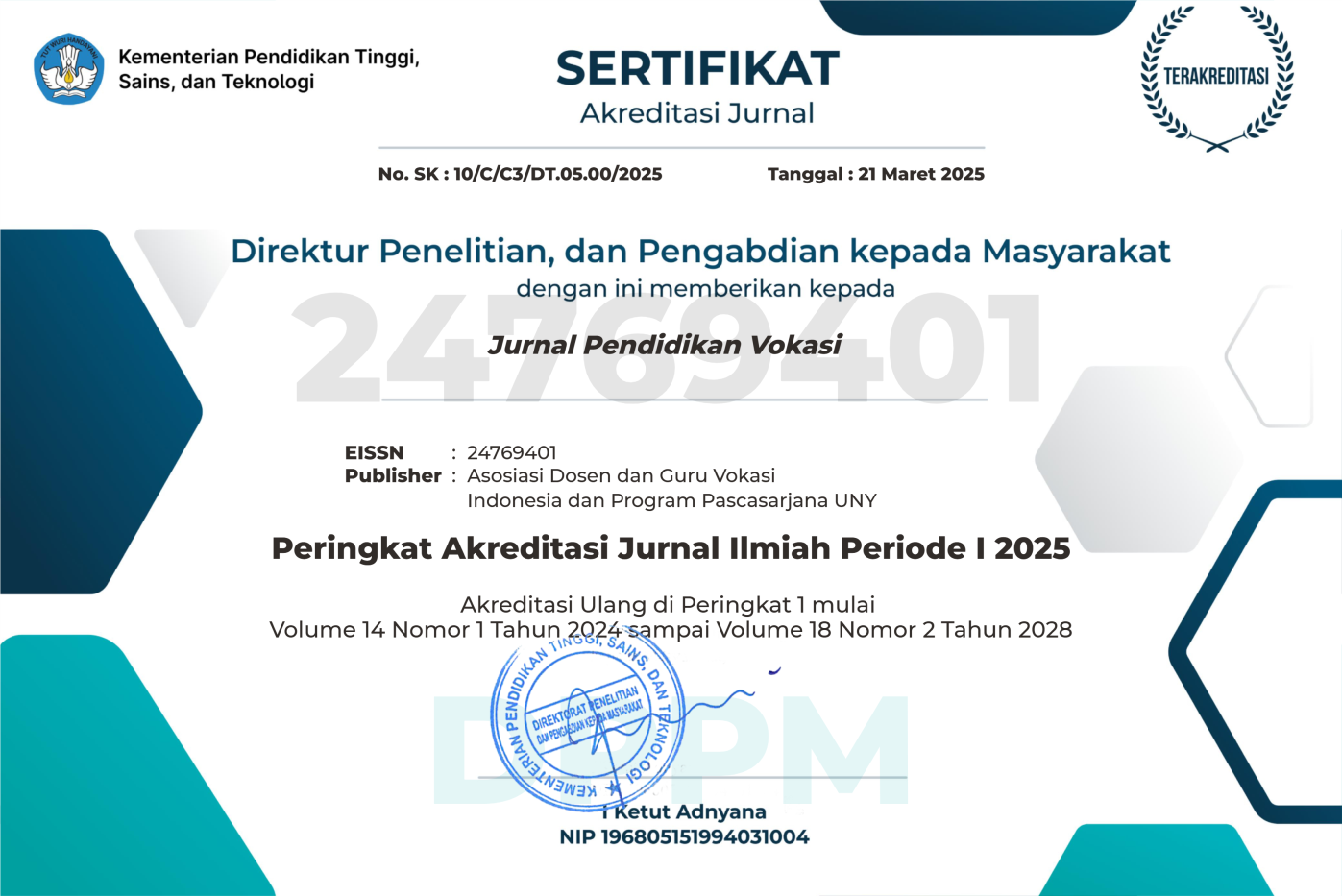Learning independence and teacher teaching skills: Does it affect learning outcomes when face-to-face learning is limited
DOI:
https://doi.org/10.21831/jpv.v12i2.50603Keywords:
Independence, learning outcomes, teaching skillsAbstract
Limited face-to-face learning is a learning policy implemented by schools to prevent coronavirus transmission during the pandemic. Amidstface-to-face learning has become limited, so that it requires students to study more independently from home. Teachers are also required to maximize class time and are also required to be skilled in providing learning outside of student learning hours in class. This study aims to determine (1) the influence of student learning independence on learning outcomes, (2) the influence of teachers' teaching skills on learning outcomes, and (3) the influence of student learning independence and teacher teaching skills during limited face-to-face learning on student learning outcomes. The research method used is quantitative with a correlational approach. This research was conducted at SMK throughout Sleman Regency. Respondents were 26 schools with a total of 2209 students. The sample calculation used Slovin with 339 samples. Data collection using questionnaires and tests with the help of google forms. The data obtained were then analyzed with several techniques such as description analysis; normality, homogeneity, multicollinearity tests; and hypothesis tests consisting of simple regression tests and multiple regression tests. The study's results obtained 1.) Learning outcomes were positively and significantly influenced by student learning independence with a value of sig. 0.023 < 0.05; 2.) Learning outcomes are positively and significantly influenced by the teaching skills of teachers with sig grades. 0.000 < 0.05; and 3.) Learning outcomes are also positively and significantly influenced by student learning independence and teacher teaching skills with a value of sig. 0.000 < 0.05.
References
Anjany, W. S. (2021). Satu tahun kebijakan PJJ, saatnya lakukan evaluasi. Kompasiana. https://www.kompasiana.com/wulansulistia0484/60e9558e56b45c73a56f0392/satu-tahun-kebijakan-pjj-saatnya-lakukan-evaluasi
Baety, D. N., & Munandar, D. R. (2021). Analisis efektifitas pembelajaran daring dalam menghadapi wabah pandemi Covid-19. EDUKATIF: Jurnal Ilmu Pendidikan, 3(3), 880–989. https://doi.org/10.31004/edukatif.v3i3.476
Dinas Pendidikan Kabupaten Sleman. (2022). Pengaturan Pembelajaran di Masa Pemberlakuan PPKM Level 3. Dinas Pendidikan Kabupaten Sleman. https://disdik.slemankab.go.id/wp-content/uploads/2022/03/4.-SURAT-EDARAN-PTM-PJJ.pdf
Direktorat Sekolah Menengah Pertama. (2022). Penyesuaian SKB 4 Menteri tentang pembelajaran di masa pandemi Covid-19. ditsmp.kemdikbud.go.id. https://ditsmp.kemdikbud.go.id/penyesuaian-skb-4-menteri-tentang-pembelajaran-di-masa-pandemi-covid-19/
Gunawan, C. (2020). Mahir menguasai SPSS: Panduan praktis mengolah data penelitian. Deepublish.
Haning, M. (2016). Are they ready to teach with technology? An investigation of technology instruction in music teacher education programs. Journal of Music Teacher Education, 25(3), 78–90. https://doi.org/10.1177/1057083715577696
Hardianti, H. (2019). Pengaruh kemandirian belajar siswa dan keterampilan mengajar guru terhadap hasil belajar akuntansi pada siswa kelas XI program keahlian akuntansi dan keuangan lembaga SMK Negeri 1 Mamuju [Universitas Negeri Makassar]. http://eprints.unm.ac.id/14792/
Harmaini, L. (2019). The influence of flipped classroom and learning independence models on student learning outcomes of class X office administration vocational school. Proceedings of the 2nd Padang International Conference on Education, Economics, Business and Accounting (PICEEBA-2 2018), 64, 344–351. https://doi.org/10.2991/piceeba2-18.2019.109
Hidayat, D. R., Rohaya, A., Nadine, F., & Ramadhan, H. (2020). Kemandirian belajar peserta didik dalam pembelajaran daring pada masa pandemi COVID-19. Perspektif Ilmu Pendidikan, 34(2), 147–154. https://doi.org/10.21009/PIP.342.9
Hossain, M. J., Ahmmed, F., Rahman, S. M. A., Sanam, S., Emran, T. Bin, & Mitra, S. (2021). Impact of online education on fear of academic delay and psychological distress among university students following one year of COVID-19 outbreak in Bangladesh. Heliyon, 7(6), e07388. https://doi.org/10.1016/j.heliyon.2021.e07388
Kim, E.-A. (2020). Social distancing and public health guidelines at workplaces in Korea: Responses to Coronavirus Disease-19. Safety and Health at Work, 11(3), 275–283. https://doi.org/10.1016/j.shaw.2020.07.006
Putri, I. (2021, September). 3 alasan pemerintah percepat sekolah tatap muka terbatas. Detik News. https://news.detik.com/berita/d-5710196/3-alasan-pemerintah-percepat-sekolah-tatap-muka-terbatas
Rabiatun, N. (2021). Pengaruh keterampilan mengajar guru terhadap hasil belajar siswa pada mata pelajaran PPKN di kelas V SD Negeri 72 Kota Bengkulu [Institut Agama Islam Negeri Bengkulu]. http://repository.iainbengkulu.ac.id/5320/
Simamora, R. M. (2020). The Challenges of online learning during the COVID-19 pandemic: An essay analysis of performing arts education students. Studies in Learning and Teaching, 1(2), 86–103. https://doi.org/10.46627/silet.v1i2.38
Sipayung, E., & Gunawan, A. S. (2013). Pengembangan sistem penilaian kualitas pelayanan dengan metode Importance Performance Analysis (IPA). Jurnal Telematika, 8(1), 22–28. https://journal.ithb.ac.id/telematika/article/view/67
Theodora, B. D. (2013). Pengaruh keterampilan mengajar guru terhadap hasil belajar siswa SMA Negeri se-Kota Malang yang dikontrol dengan variasi sumber belajar [Universitas Negeri Malang]. http://repository.um.ac.id/61192/
Yunus, M., Setiawan, D. F., & Wuryandini, E. (2021). Persepsi mahasiswa terhadap pembelajaran online pada masa pandemi COVID-19. Jesya (Jurnal Ekonomi Dan Ekonomi Syariah), 4(2), 1196–1202. https://doi.org/10.36778/jesya.v4i2.476
Downloads
Published
How to Cite
Issue
Section
Citation Check
License
The authors submitting a manuscript to this journal agree that, if accepted for publication, copyright publishing of the submission shall be assigned to Jurnal Pendidikan Vokasi. However, even though the journal asks for a copyright transfer, the authors retain (or are granted back) significant scholarly rights.
The copyright transfer agreement form can be downloaded here: [JPV Copyright Transfer Agreement Form]
The copyright form should be signed originally and sent to the Editorial Office through email to jpvokasi@uny.ac.id
Jurnal Pendidikan Vokasi by http://journal.uny.ac.id/index.php/jpv is licensed under a Creative Commons Attribution-ShareAlike 4.0 International License.














